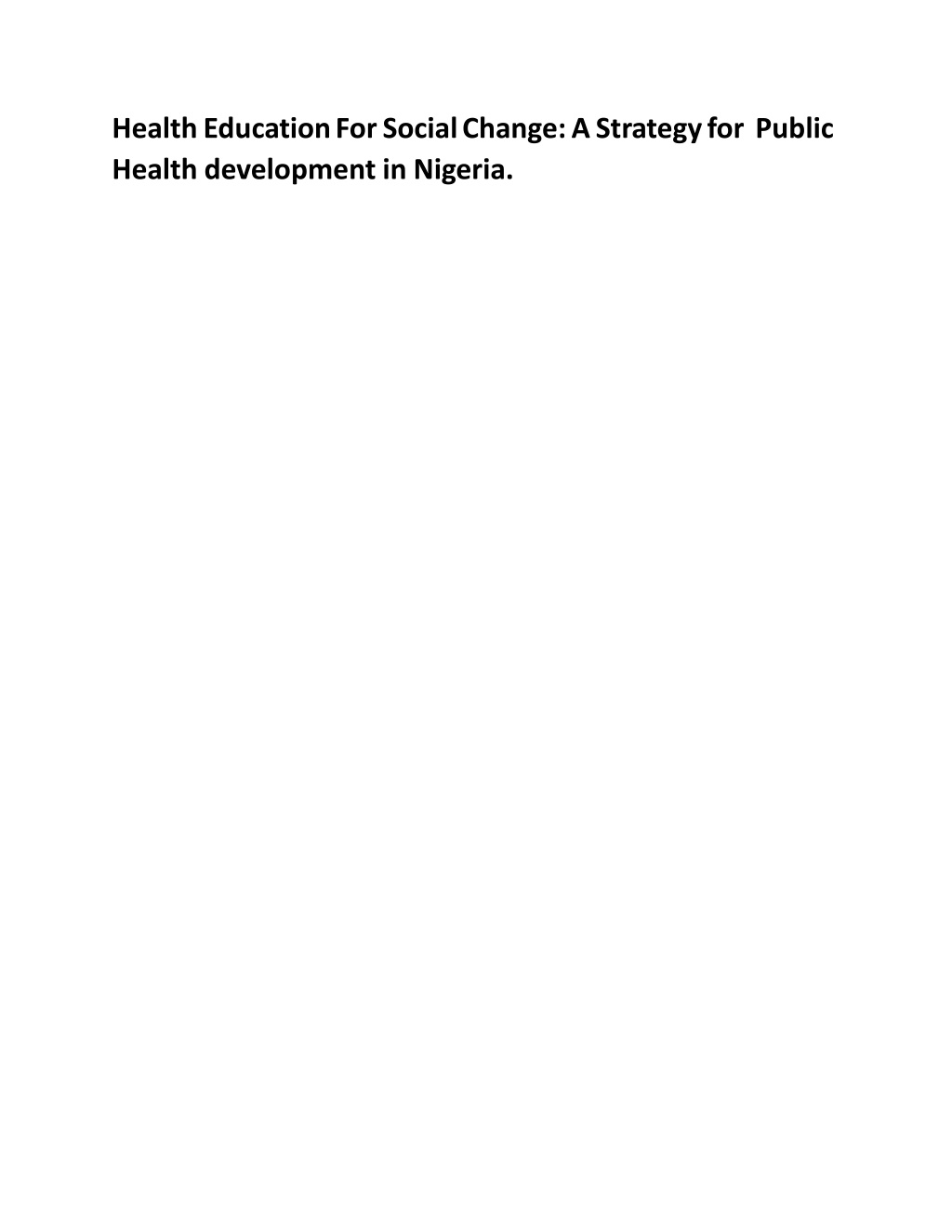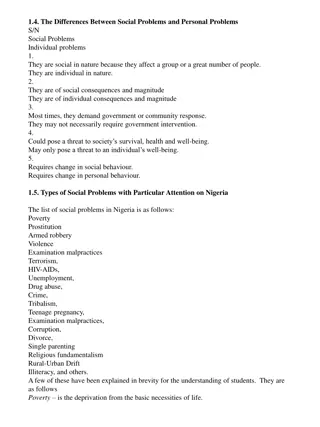Health Education for Social Change: A Strategy for Public Health Development in Nigeria
The practice of health education in Nigeria dates back to the 1950s, playing a crucial role in promoting health and well-being. Health education provides vital information to the populace, empowering individuals to make informed decisions for better health outcomes. It covers a wide range of topics, from disease prevention to health promotion, ultimately aiming to reduce healthcare spending and improve productivity. The importance of health education programs cannot be overstated in empowering communities and achieving positive health outcomes in Nigeria.
Download Presentation

Please find below an Image/Link to download the presentation.
The content on the website is provided AS IS for your information and personal use only. It may not be sold, licensed, or shared on other websites without obtaining consent from the author. Download presentation by click this link. If you encounter any issues during the download, it is possible that the publisher has removed the file from their server.
E N D
Presentation Transcript
HealthEducationForSocialChange:AStrategyfor Public Health development in Nigeria.
INTRODUCTION The practice of health education in Nigeria has been in existence for centuries. As far back 1950 s. It was common to observe in primary and secondary schools and in teachers training institutions. Teachers inspecting children for cleanliness when children are found to be untidy or in need of immediate health attention. They were usually sent home or given first aid or sent to appropriatehealthproviders. The roles of health education in promoting health in Nigeria cannot be over emphasized. It has gone a long way to revert the health sector and the delivery system in terms of saving lives and thebettermentofthe populace. Health education is one of the means of implementing health promotion and disease prevention programs. Studies have shown that the global economic challenges, social and environmental factors are the causes of many diseases and behaviours that are associated to illnesses. Health education provides information to target population on a particular health topics, including health benefits and threats they faced, thereby providing tools to build capacity and support behavioural changes in an appropriate settings. Health education can help to boost the economy by reducinghealthcarespending and lostproductivity duetopreventableillness.
HEALTH EDUCATION Health is the extent to which an individual or group is able to realize aspirations and satisfy needs and also change or cope with the environment. Health is the level of the general condition of a person s mind and body, usually meaning to be free from illness, injury or pain (as in good health or healthy ). The World Health Organization (WHO) defined health in its broader sense in 1946 as a state of complete physical, mental, and socialwell-beingand notmerely theabsenceofdiseaseor infirmity.
HEALTH EDUCATIONINNIGERIA As well as health education in Nigeria is a concurrent responsibility of the three tiers of government in the country. Private providers of health care have a visible role to play in health care delivery. The federal government s role is mostly limited to coordinating the affairs of the university teaching hospitals, Federal Medical Centres (tertiary health care) while the state government manages the various general hospitals (secondary health care) and the local government focus on dispensaries (primary health care), which are regulated by the federal governmentthroughtheNPHCDA.
IMPORTANCEOF HEALTHEDUCATION Health education programs help empower individuals and communities to live healthier lives by improving their physical, mental, emotional and social health by increasing their knowledge and influencing theirattitudesaboutcaring for theirwell-being. Health education focuses on prevention, increasing health equity, and decreasing negative health outcomessuch as availability andaccessibility ofhealthservices, benefiting all stakeholders.
COMMUNITYHEALTH EDUCATION Roles of health education has been described as the science and art of preventing disease, prolonging life and promoting health through the organized efforts and informed choices of society, organizations, public and private, communities and individuals. It is concerned with threats to the overall health of a community based on population health analysis. Public health has many sub-fields, but typically includes the interdisciplinary categories of epidemiology, biostatistics and health services. Environmental health, community health, behavioral health, and occupationalhealthare alsoimportantareasofpublichealth.
The focus of Nigeria in health education is to prevent and manage diseases, injuries and other health conditions through surveillance of cases and the promotion of healthy behavior, communities, and (in aspects relevant to human health) environments. Its aim is to prevent health problems from happening or re-occurring by implementing educational programs, developing policies, administering services and conducting research. In many cases, treating a disease or controllinga pathogencan be vital topreventing it in others,suchas during an outbreak.
ECONOMIC IMPORTANCEOFHEALTH EDUCATION Health education in Nigeria has helped boost the economy by reducing healthcare spending and lost productivity due to preventable illness. Obesity and tobacco use, for example, cost Nigeria billions of naira each year in healthcare costs and lost productivity. Health and education are two closely related human capital compo nents that work together to make the indi vidual more productive and therefore promote economicgrowth
HEALTH EDUCATIONFOR SOCIALCHANGE Recognizing that health improvement activities and performance monitoring imply the need for change in communities, the committee for health in Nigeria sought to explore some of the theories of social change and how they might relate specifically to health and health care. It was noted that change is ubiquitous today in health care systems, health care policy, and social policy and is occurring in multiple dimensions.
CONCLUSION The roles of health education in promoting health in Nigeria cannot be over emphasized. It has gone a long way to revert the health sector and the delivery system in terms of saving lives and the betterment ofthepopulace. Also, traditional medical practices are very much a part of the health care delivery system in Nigeria today as they were during and before the struggle for independence. Health care during the period of independence was oriented primarily to curative rather than preventive care. For example, as a result of the poor attempt to establish preventive programs, measles remained the greatest killer of children. By this time, the WHO had proven beyond reasonable doubt that proper execution of preventive programs can eradicatedeadlydiseases, and indeed, smallpoxwas almostnon-existentin Nigeria at thistime.























